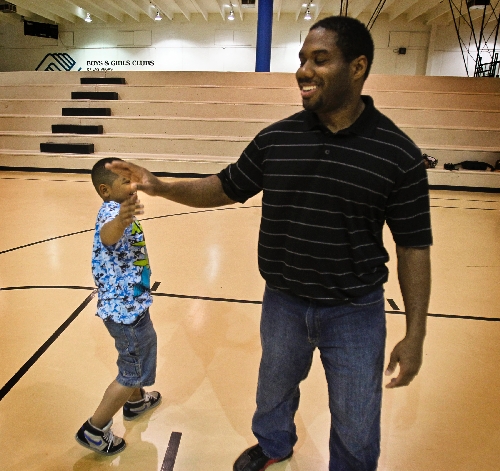Big Brothers Big Sisters: Big impact for kids
Who would you be in Southern Nevada if you regularly used the terms "Bigs" and "Littles"?
You probably would be one of the volunteers, clients or staff members of the nonprofit child-mentoring organization Big Brothers Big Sisters of Southern Nevada. Molly Latham, vice president of program services, talks of her organization's mission: "Children need adults in their lives who care about them. Big Brothers Big Sisters has the capacity to change children's lives."
Because family members and coaches had a positive impact on Las Vegan Clifton Cole, he became a Big Brother to Azeem, 10.
"I felt a need to give back after what I was given," he says. " Azeem and I have really hit it off; we do homework, we play basketball, we laugh and talk. I look forward to seeing him every week."
Big Brothers was founded in 1904 when a court clerk in New York realized that many young men in trouble would benefit from guidance from a caring adult. In 1977, Catholic Big Sisters, an independent organization with a similar mission, joined Big Brothers. The organization came to Southern Nevada in 1973. Today, Big Brothers Big Sisters of Southern Nevada supports 370 mentoring partnerships, with a waiting list of 400 children.
For Bigs and Littles, mentoring is the object. The Big Brothers and Big Sisters are volunteers; the children and their parents don't pay for services.
Program services include extensive background checks and interviews with prospective program participants, monthly mixers and ongoing professional support. Throughout the life of a match, for example, a match support specialist checks monthly with the child, the volunteer, and the child's parent or guardian to monitor the progress of the relationship.
Many long-term matches begin with the organization's site-based programs. Once a week, at the same time every week, all the children in the program from a particular elementary school or Boys & Girls Club meet with their bigs for an hour. A match support specialist is also present. Eight elementary schools and four Boys & Girls Clubs are now part of the site program.
Community-based matches involve volunteers and clients who participate in activities not confined to particular sites. Luis Bansin and his Little Brother Logan (children's last names are not released), 16, have been together more than five years. They started as a site-based match and have since graduated to a community-based relationship, sharing meals, movies and other activities around Las Vegas, and even appearing together on a local radio program.
"Logan is very bright," Bansin says, "so recently I went with him to an orientation for advanced placement classes in his school. I'm not his parent, but I am his friend. Our goal together is to see that Logan is able to get a scholarship and go to college."
Latham notes that 85 percent of children in the program qualify for free or reduced-price lunches, and 92 percent are from single-parent or no-parent families (raised by other relatives or in foster care). That does not mean, however, that children in the program are necessarily from bad emotional environments.
David, 13, is the Little Brother of Lewis Barlow, who stresses: "David's mother is a single parent, and she's done a wonderful job with him. She simply wanted another positive influence in David's life. "
Barlow says being a Big Brother brings out the best in him.
"I feel a sense of obligation with David - showing up on time and being responsible - because I know children copy everything we do. "
Barlow adds that he knows his relationship with David is important to the youngster, too.
"He's never turned down an opportunity to meet with me," he says.
Kobbe Shaw, Big Brothers Big Sisters of Southern Nevada development director, says he could almost "jump up and down" to tell the world the value of his organization's work.
"You know that in Clark County, we have one of the lowest graduation rates in the nation," he says. "New Superintendent Dwight Jones is a welcome breath of fresh air to the school district. We hope he understands we have a program that works."
Shaw says the agency is beginning to compile long-term statistics. Here are a few examples:
■ 90 percent of children in the Big Brothers Big Sisters program are likely to advance to the next grade level.
■ 68 percent see an increase in grades.
■ Required parent conferences of program participants decrease by 120 percent.
As eager as Shaw is to promote the value of his organization and to recruit new Bigs (community-match volunteers are ages 25 and older, including senior citizens, while high school students can participate in site-based programs), he is also necessarily enthusiastic about raising funds for programming.
The organization has a yearly $1.6 million budget. Almost 80 percent of operating funds for Big Brothers Big Sisters of Southern Nevada is raised by the organization's ongoing drives for used clothing and small household goods.
A team of people on the second floor of the headquarters building at 4605 E. Post Road schedule pickups for five trucks that roam the valley six days a week. The donations are taken to local Savers stores, which buy the donations in bulk.
"If we need clothing for one of our families, we may divert a few donations, but principally, we are supplying goods to Savers," Shaw explains.
"The used-clothing business is big business here," he continues, "so much so that we've even had donations stolen. We're very proud of our new texting program which allows us to communicate with so many in the valley who are using cellphones, not land lines. We're collecting about 10 million pounds of cloth a year."
To learn more about Big Brothers Big Sisters online, visit bbbsn.org or text 59925 and use the key word "donate" to find the next Big Brothers Big Sisters pickup. Individuals interested in becoming a Big Brother or Big Sister can call a match support specialist at 731-2227.


















